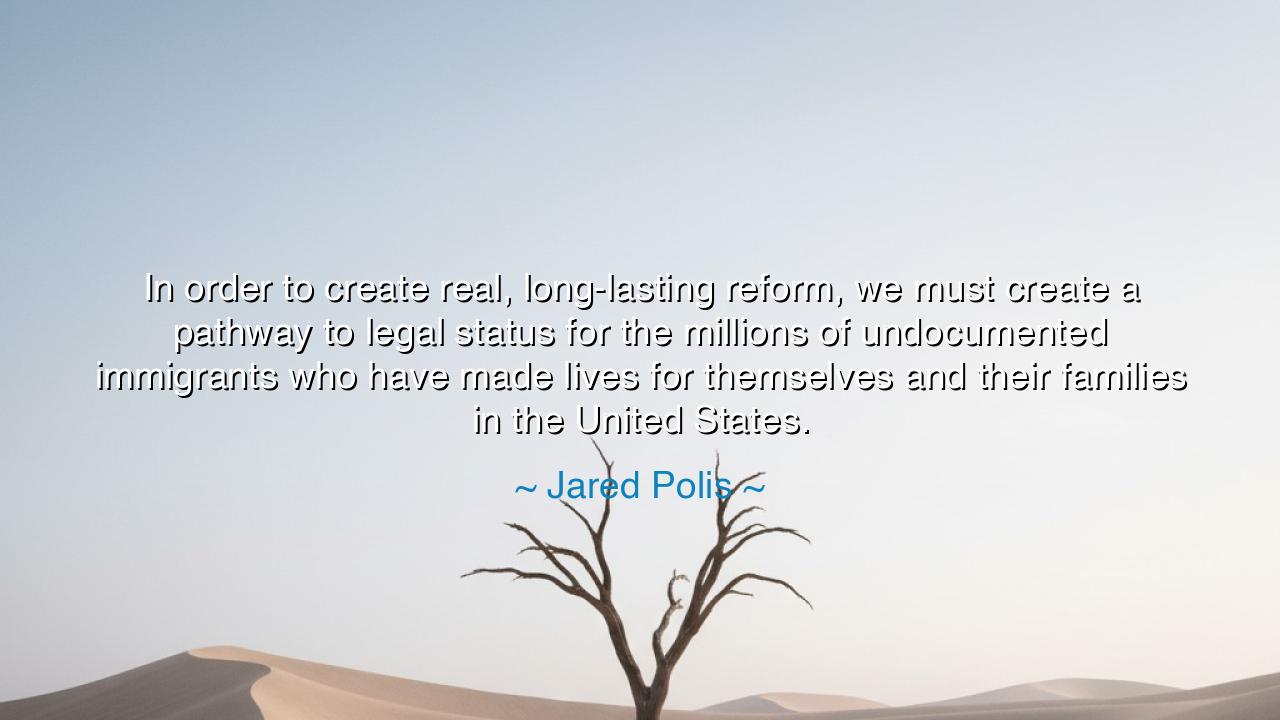
In order to create real, long-lasting reform, we must create a
In order to create real, long-lasting reform, we must create a pathway to legal status for the millions of undocumented immigrants who have made lives for themselves and their families in the United States.






The words of Jared Polis carry the tone of both reason and compassion: “In order to create real, long-lasting reform, we must create a pathway to legal status for the millions of undocumented immigrants who have made lives for themselves and their families in the United States.” This statement is not merely political — it is profoundly human. It speaks to a truth as old as civilization itself: that those who labor, build, and love within a land should not live in the shadows of fear. It calls upon the eternal principles of justice, mercy, and belonging, reminding us that laws are not meant only to restrict, but to heal and to include.
In the great chronicles of history, nations have risen not by closing their gates, but by opening their hearts. The pathway to legal status is not a mere bureaucratic invention; it is the bridge between despair and dignity. It is a recognition that to truly reform a system, one must begin with compassionate truth — the truth that millions who came seeking hope have already woven their lives into the very fabric of the land they now call home. They till the soil, build the homes, serve the meals, raise the children, and keep alive the humble dream that tomorrow may be kinder than yesterday. To deny them acknowledgment is to deny the humanity that binds all people together.
Polis’s words emerge from the heart of the American story — a nation born of immigrants, sustained by dreamers, and strengthened by the courage of those who left everything behind to seek freedom. From Ellis Island to the deserts of the Southwest, the same light has called to them: the promise of opportunity, of safety, of belonging. Yet, across generations, laws have too often lagged behind morality. Those who have already given their loyalty and labor are left wandering the narrow passage between hope and invisibility. Polis calls upon us to finish what the nation began — to reform not with fear, but with foresight.
History reminds us that every era faces this same trial. In ancient Rome, slaves who had earned their freedom could become citizens — a recognition that contribution earns belonging. In the New World, the Puritans fled persecution seeking freedom, only to build societies where others would later fight for inclusion. The cycle repeats until humanity learns that legal status is not simply a matter of law, but a reflection of the moral soul of a people. The story of Emma Lazarus, whose words are inscribed on the Statue of Liberty — “Give me your tired, your poor, your huddled masses yearning to breathe free” — stands as both beacon and burden. Those words are not history; they are prophecy waiting to be fulfilled.
To create real, long-lasting reform, as Polis declares, is to move beyond temporary measures and political convenience. It is to establish a foundation that honors both the rule of law and the reality of human life. Reform that endures is born not from division, but from unity — not from punishment, but from understanding. The pathway he speaks of is not a surrender of sovereignty; it is an affirmation of justice. For when millions live and work without recognition, the nation itself bears a hidden wound — a quiet hypocrisy that weakens its moral strength.
The lesson here is timeless: a society that forgets the humanity of its workers, its neighbors, its immigrants, forgets itself. Reform must begin in the heart before it takes shape in law. One cannot build lasting peace upon fear, nor lasting prosperity upon exclusion. The pathway to legal status is more than a policy; it is a moral covenant — an agreement between a nation and the human spirit that sustains it. To grant recognition to those already part of the nation’s body is not generosity — it is justice long overdue.
So, to those who listen and seek wisdom: remember that nations are not defined by their borders, but by the compassion that lives within them. Build systems that heal rather than harm. Speak not of walls, but of bridges. See not the “undocumented” as outsiders, but as part of the shared human story — seekers of safety, bearers of dreams, carriers of the same light that once guided your ancestors. For in giving them a pathway to belonging, you give the nation back its heart. And from that heart, true reform — enduring, radiant, and righteous — will finally rise.






AAdministratorAdministrator
Welcome, honored guests. Please leave a comment, we will respond soon